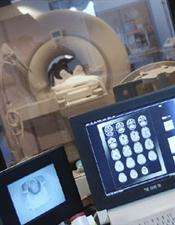Artificial Intelligence Shuffles Schedules, Cuts Patients' Wait Times

(PhysOrg.com) -- Some of the same artificial intelligence (AI) underlying NASA’s Hubble Space Telescope is now streamlining patient care at Strong Memorial Hospital, helping radiologists and technologists juggle the hundreds of requests for CT scans, ultrasounds, and other imaging procedures that they receive daily. This AI technology - a software program called On-Cue - works like an air-traffic controller to shuffle procedure schedules for Strong Memorial’s emergency department, inpatient units and outpatient clinics, with the twin goals of shortening wait times and helping staff use equipment more efficiently.
“The health care universe is unpredictable,” said David Waldman, M.D., Ph.D., chairman of URMC’s Department of Imaging Sciences. “Things change by the minute, as there are multiple portals for patients to arrive by in need of our help. Naturally, all of them are anxious to have scans conducted as quickly as possible so that further care decisions can be made.”
Strong’s Imaging Sciences Department not only conducts pre-scheduled outpatient procedures - its staff also tend to inpatients’ imaging needs, as well as emergent, unpredicted requests for scans (e.g., for trauma and stroke victims).
“Ironically, the scans themselves are the shortest part of the process, taking on average about six minutes each. But the prep work, and making sure the necessary machines are available, is more nettlesome. This is where On-Cue software steps in, helping us prioritize requests and meet them as quickly as possible,” Waldman said. “The software provides a real-time, common view of our schedule to all caregivers, keeping everyone on the same page. This is critical in an environment that’s constantly changing.”
The new software factors in key variables (such as if a patient must drink “contrast fluids” in advance of a scan, but is a slow sipper), and works non-stop to adjust schedules as timelines shift and new requests funnel in.
“Right away, we noticed benefits with using this scheduling software,” said Constance White, director of Clinical Operations for Imaging Sciences at URMC. “At Strong Memorial Hospital, we currently have six scanners, divided between three control rooms that are each about a football field apart. Before this software, communication between these rooms consisted of frenzied phone calls and sticky notes. Some scanners sometimes went under-utilized, while others were buckling under the volume.”
Now that has changed, she said. Imaging Sciences staff are able to see a full view of which scanners are in use, and are alerted to openings for slipping extra procedures in. Technologists also can chat between control rooms with the built-in instant messaging feature, and physicians can fire off electronic notes documenting the patient’s information, or making requests that special information be captured in a scan. Soon, an add-on application will allow Emergency Department (ED) physicians to “peer in” and see where their patients fit into Imaging Science’s schedule. This will help ED staff judge when it’s time to begin important prep tasks.
“In addition to being a smart scheduler and enhancing our communication, the software provides us the data we need to pinpoint where ‘bottlenecks’ typically crop up,” White said. “By identifying these problem areas, we’re better able to strategize to improve the way we work.”
Strong Memorial Hospital installed the On-Cue software, which represents a $240K investment over the course of three years, in April. The software is produced by the California-based company Allocade, Inc., which was founded by Don Rosenthal (now also its chief technology officer), who led the Artificial Intelligence Applications Group at the NASA Ames Research Center. The underlying On-Cue engine is the result of Rosenthal’s work with the Hubble Space Telescope.
Provided by University of Rochester Medical Center (news : web)
















